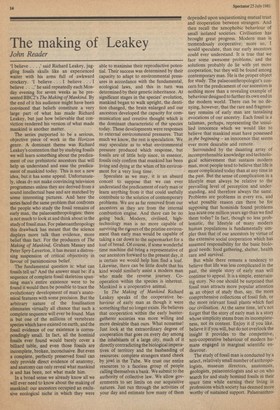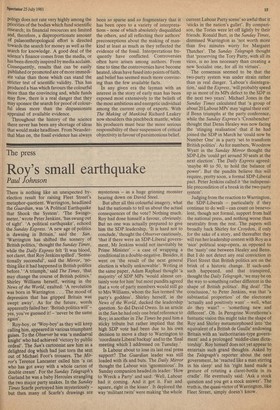The making of Leakey
John Reader
'I believe . . . ,' said Richard Leakey, juggling fossils skulls like an experienced waiter with his arms full of awkward crockery. 'I believe . . . I believe . . . I believe . . .,' he said repeatedly each Monday evening for seven weeks as he presented BBC2's The Making of Mankind. By the end of it his audience might have been convinced that beliefs constitute a very large part of what has made Richard Leakey, but just how believable that conviction rendered his version of what made mankind is another matter.
The series purported to be a serious, objective piece of work in the Horizon genre. A dominant theme was Richard Leakey's contention that by studying fossils we will learn something about the predicament of our prehistoric ancestors that will help us understand and ease the predicament of mankind today. This is not a new idea, but it has some appeal. Unfortunately, ideas do not make convincing television programmes unless they are derived from a sound intellectual base and are matched by some interesting pictures. And here the series faced the same problem that confronts the people who study the fossil remains of early man, the palaeoanthropologists: there is not much to look at and think about in the study of fossil,man. For palaeoanthropology this drawback has meant that the science displays more talk than evidence, more belief than fact. For the producers of The Making of Mankind, Graham Massey and Peter Spry-Leverton, it has meant a distressing suspension of critical objectivity in favour of parsimonious belief.
The fundamental question is: what can fossils tell us? And the answer must be: if a sequence of complete fossil skeletons spanning man's entire existence were to be found it would then be possible to trace the evolutionary development of man's anatomical features with some precision. But the arbitrary nature of the fossilisation eliminates virtually all chance that such a complete sequence will ever be found. Man is but one of the millions of vertebrate species which have existed on earth, and the fossil evidence of our existence is correspondingly small. In fact, all the hominid fossils ever found would barely cover a billiard table, and even those fossils are incomplete, broken, inconclusive. But even a complete, perfectly preserved fossil can only provide direct evidence of anatomy, and anatomy can only reveal what mankind is and has been, not what made him.
In a broad sense we already know all we will ever need to know about the making of mankind: our ancestors occupied an exclusive ecological niche in which they were able to maximise their reproductive potential. Their success was determined by their capacity to adapt to environmental pressures in accordance with the fundamental, ecological laws, and this in turn was determined by their genetic inheritance. At significant stages in the species' evolution, mankind began to walk upright, the dentition changed, the brain enlarged and our ancestors developed the capacity for communication and creative thought which is the dominant characteristic of the species today. These developments were responses to external environmental pressures. That much we know, the rest is speculation. We may speculate as to what environmental pressure produced which response, but fossils are of little help since, in essence, fossils only confirm that mankind has been living and dying at the whim of his environment for a very long time.
Speculate as we may, it is an absurd conceit to suppose that we can ever understand the predicament of early man or learn anything from it that could usefully contribute to the solution of contemporary problems. We are as far removed from our ancestors as they are from the internal combustion engine. And there can be no going back. Modern, civilised, hightechnology man is no more capable of surviving the rirurs of the pristine environment than early man would be capable of taking a car down to the supermarket for a loaf of bread. Of course, if some wonderful time machine did bring a representative of our ancestors forward to the present day, it is certain we would help him find a loaf. Likewise, there can be little doubt that his kind would similarly assist a modern man who made the reverse journey. Cooperation within the species is inherent. Mankind is a cooperative animal.
In The Making of Mankind Richard Leakey speaks of the cooperative behaviour of early man as though it were something that no longer exists. He believes that cooperation within the early huntergatherer societies was more willing and more desirable than ours. What nonsense! Just look at the extraordinary degree of cooperation that goes on every day among the inhabitants of a large city, much of it directly contradicting the biological imperatives of territory and the husbanding of resources: complete strangers stand cheek by jowl in the Tube. We trust our entire resources to a faceless group of people calling themselves a bank. We submit to the authority of collective law. We allow governments to set limits on our acquisitive natures. Just run through the activities of your day and estimate how many of them depended upon unquestioning mutual trust and cooperation between strangers. And then recall the xenophobic behaviour of small isolated societies. Civilisation has brought great progress. Modern man is tremendously cooperative; more so, I would speculate, than our early ancestors could ever understand. It is true that we face some awesome problems, and the solutions probably do lie with yet more cooperation, but they will be found among contemporary man. He is the proper object for study. The palaeoanthropologist's concern for the predicament of our ancestors is nothing more than a revealing example of behaviour designed to further its own end in the modern world. There can be no denying, however, that the rare and fragmentary remains of early man are tantalising evocations of our ancestry. Each fossil is a talisman, perhaps, representing the unsullied innocence which we would like to believe that mankind must have possessed in the beginning — an innocence that seems ever more desirable and remote.
Surrounded by the daunting array of incomprehensible knowledge and technological achievement that sustains modern man, most people tend to believe that life is more complicated today than at any time in the past. But the sense of complication in a lifestyle must always be relative to the prevailing level of perception and understanding, and therefore always the same. Problems are problems in every era, and what possible reason can there be for supposing that hominids found problems less acute one million years ago than we find them today? In fact, though no less problematic, the lifestyle of many modern human populations is fundamentally simpler than that of our ancestors by virtue of the extensive social cooperation which has assumed responsibility for the basic biological needs: food gathering, shelter, health care and survival.
But while there remans a tendency to believe that life was less complicated in the past, the simple story of early man will continue to appeal. It is a simple, entertaining story. No one should be surprised that fossil man attracts more popular attention as an object of study than, say, the more comprehensive collections of fossil fish, or the more relevant fossil plants which fuel our civilisation. At the same time, let's not forget that the story of early man is a story whose simplicity stems from its incompleteness, not its content. Enjoy it if you like, believe it if you will, but do not overlook the insight it provides to the competitive, non-cooperative behaviour of modern humans engaged in marginal scientific endeavour.
The study of fossil man is conducted by a select, relatively small number of anthropologists, museum directors, anatomists, geologists, palaeontologists and so on who search for and study hominid fossils in their spare time while earning their living in professions which society has deemed more worthy of sustained support. Palaeoanthro pology does not rate very highly among the priorities of the bodies which fund scientific research; its financial resources are limited and, therefore, a disproportionate amount of palaeonthropological effort is directed towards the search for money as well as the search for knowledge. A good deal of the science's finance comes from the media, or has been directly inspired by media acclaim. Consequently, results that can be easily published or promoted are of more immediate value than those which can stand the stricter test of scientific validity. This has produced a bias which favours the colourful more than the convincing and, while funds may flow, there is a real danger that they may sponsor the search for proof of colourfitl ideas more than the dispassionate appraisal of available evidence.
Throughout the history of the science there never has been any shortage of ideas that would make headlines. From Neanderthal Man on, the fossil evidence has always been so sparse and so fragmentary that it has been open to a variety of interpretations — none of which absolutely disqualified the others, and all reflecting their authors' preconceptions about the making of mankind at least as much as they reflected the evidence of the fossil. Interpretations frequently have conflicted. Controversies often have arisen among authors. From time to time the controversies have become heated, ideas have fused into points of faith, and belief has seemed much more convincing than the few available facts.
In any given era the layman with an interest in the story of early man has been exposed most extensively to the beliefs of the most ambitious and energetic individual among the current crop of experts. With The Making of Mankind Richard Leakey now shoulders this pinchbeck mantle, while his producers must bear the more serious responsibility of their suspension of critical objectivity in favour of parsimonious belief.



































 Previous page
Previous page